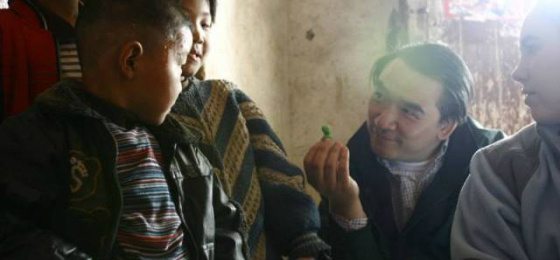
(ECNS) -- To many journalists who have talked with Du Cong (Chung To in Cantonese), he's come across as a talkative, easygoing and friendly speaker always eager to share.
His Chi Heng Foundation, literally meaning "wisdom in action", has been much covered by media at home and abroad. His name also accompanies a string of titles – Columbia and Harvard alumni, former banker on Wall Street, former Associate Director of UBS and founder and chairman of the charity foundation.
In his 40s, Du spent the past 18 years helping orphans whose parents died of AIDS as well as other HIV/AIDS-impacted families in central China. Many of the patients were infected amid a well-intended campaign to encourage blood donation in the early 1990s that went wrong. What Du saw during a visit to some villages in 2002 shocked him and finally led to his decision to quit his job as a banker. From then on, the foundation also shifted from promoting awareness of HIV/AIDS to directly helping children impacted by the disease.
Du believes education is key to the future of these children. Thus, instead of setting up orphanages, Chi Heng chose to directly fund their tuition, so that they could still stay in the community while gaining knowledge and skills. Chi Heng even thought about their future jobs. A bakery and an eco bag factory were set up by the foundation as two social enterprises to get the HIV/AIDS-impacted people employed.
Now, Du seems even busier than a banker. His agenda is packed with lectures, speeches and other activities during his short stay in Beijing. On Thursday, he addressed the opening ceremony of Havard Model United Nations China 2016 and hurried to a college campus dozens of kilometers away to give another lecture.
ECNS interviewed him during a short break between events.
Q: You seem very busy with all kinds of activities. Is that the norm for you working at Chi Heng?
A: Yes. I'm always like that… flying from one city to another and attending activities. Many people have asked me: Why do you give 40 to 50 lectures a year when you already have a lot of work to do at the foundation? But I think I have the duty to get more people, especially young people to be aware of social needs and charity work. They don't have to help Chi Heng; they don't have to work full time; but they should develop a feeling for society at an early age.
Q: So what about you? When did you start to think "I have to do something?"
A: I think I was largely inspired by my grandma who passed away when I was a boy. I still remember that there was a beggar outside a restaurant we frequently went to. Every time, my grandma would give me some coins and asked me to give them to the beggar. At first, I didn't like to do it as the beggars were dirty and stinky. And I thought my grandma must hate to do that too, so she had me do it for her. But one day, grandma said this to me - "You see, my dear, there are many people out there in need of help. So remember to do something for them when you grow up." It later came to me that my grandma was trying to teach me the lesson through action, when I was too little to understand big theories. Besides, she knew that I had no ability to help the beggar, so she passed the opportunity of doing some good on to me.
I think what we're doing at Chi Heng is pretty much the same as what my grandma did. We are encouraging children we helped to help others. We would arrange some homework for elder children during their vacations, asking them to visit other younger children in families with HIV/AIDS in their hometowns. They would cheer up these kids with their own stories, telling them that they can also change their lives with knowledge and education. So, just like my grandma, we helped some children, and we hope they can keep on helping others.
I believe children need more positive energy and encouragement. I told them not to whine about the "empty half of the glass", but focus on the "water in the glass". Complaining doesn't change anything.
Q: Tell us more about Chi Heng. What makes it different from other HIV/AIDS charity missions?
A: We hope our model can support the sustainable development of children. And we encourage them to come back and help others with similar experiences. That is an integrated ecological closed-loop. I think most of the charity missions are not aware of the importance of the latter spirit that the receiver can actually turn into a helper. For instance, a drug rehab may feel its job is done after helping drug users quit addiction, but seldom do these rehabs hire back a recovered drug user to work and help other drug addicts. At Chi Heng, 70 percent of employees are those who received our help. I think it's a very good model because these workers can build closer ties with beneficiaries and understand their needs. That's why we cherish the spirit of "help within the community" very much.


















































